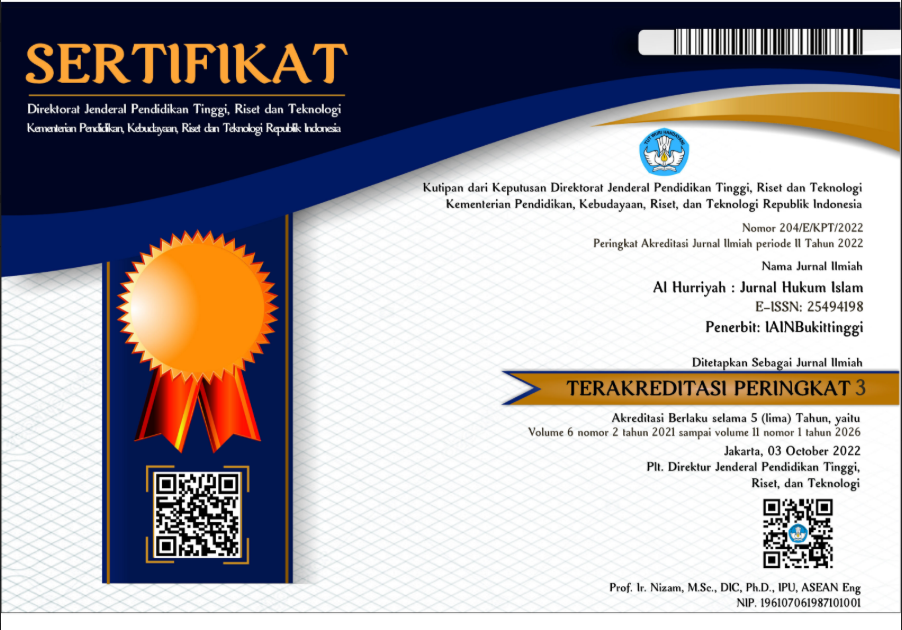IMPLEMENTASI UNDANG-UNDANG NOMOR 1 TAHUN 1974 TENTANG IZIN POLIGAMI DI PENGADILAN AGAMA BUKITTINGGI (Studi Kasus Perkara Nomor 081/Pdt.G/2013/PA.Bkt dan Perkara Nomor 0328/Pdt.G.2015/PA.Bkt)
DOI:
https://doi.org/10.30983/alhurriyah.v4i1.1173Keywords:
poligami, syarat alternatif, syarat kumulatif, Undang-Undang Nomor 1 tahun 1974Abstract
The provision of polygamy as regulated in Law Number 1 of 1974 states that a husband who is going to polygamy must meet alternative and cumulative requirements. Without the fulfillment of the two conditions mentioned, the application for polygamy will be rejected by the judge. But in reality, the Bukittinggi Religious Court differed in ruling two polygamy cases which both met cumulative requirements and did not meet alternative conditions. In the first case case Number 081 / Pdt.G / 2013 / PA.Bkt the judge has accepted the request for polygamy, while in the second case case Number 0328 / Pdt.G / 2015 / PA.Bkt. the judge did not accept (NO) the case. The implementation of Law Number 1 of 1974 concerning polygamy permits in the Bukittinggi Religious Court is not absolute, the consideration of judges who receive and examine cases Number 081 / Pdt.G / 2013 / PA.Bkt is the emergence of mudharat if the case is rejected even though the alternative conditions are not met . Whereas the judge examining case 0328 / Pdt.G / 2015 / PA.Bkt was based on the provisions of article 4 of Law Number 1 of 1974 rejecting the case because it did not meet alternative conditions. Due to the non-fulfillment of alternative conditions by the Petitioner, the request for polygamy permit had a formal defect. For this reason, the panel of judges no longer needs to examine the subject matter.
References
Abidin, Slamet dan Aminuddin, Fiqh Munakahat, Bandung: CV. Pustaka Setia, 1999
Afrizal, Hakim Pengadilan Agama Koto Baru Solok, Wawancara Pribadi, Sabtu, 27 Januari 2018, Pukul 19.00 WIB
Ahmad, Karim Ilmi Farhat, Ta’addu az-Zaujat fi al-Adyan, Dar al-Afaq al-‘Arabiyyah, 2007
Arnel, Hakim Pengadilan Agama Maninjau, Wawancara Pribadi, Minggu, 28 Januari 2018, Pukul 11.00 WIB
Doi, A. Rahman I., Penjelasan Lengkap Hukum-Hukum Allah (Syari’ah), Jakarta: Rajawali Pres, 2002
Ghozali,, Abdul Rahman, Fiqh Munakahat, Jakarta: Kencana, 2010
Harahap, Yahya, Hukum Perkawinan Nasional, Medan: Zahir Trading Co Medan, 1975
Mahmud, Metode Penelitian Pendidikan, Bandung: Pustaka Setia, 2011
Martias, Hakim Pengadilan Agama Bukittinggi, Wawancara Pribadi, Jum’at, 12 Januari 2018, Pukul 09.00 WIB
Nasution, Khairuddin, Status Wanita di Asia Tenggara; Studi terhadap Perundang-undangan Perkawinan Muslim Kontemporer di Indonesia dan Malaysia, Jakarta: INIS, 2002
Nuruddin, Amir dan Azhari Akmal Tarigan, Hukum Perdata Islam di Indonesia, Jakarta: Kencana, 2004
Rafiq, Ahmad, Hukum Islam di Indonesia, Jakarta: Rajawali Pres. 1998
Saebani, Beni Ahmad, Fiqh Munakahat 2, Bandung: CV Pustaka Setia, 2001
Suryabrata, Sumardi, Metodologi Penelitian, Jakarta: PT Raja Grafindo Persada, Cetakan Ke-11, 1998
Sutopo, Istilah dan Adagium Hukum, Semarang: YPPHIM Kantor Perwakilan Jawa Tengah, 2001
Undang-Undang Republik Indonesia Nomor 1 Tahun 1974 tentang Perkawinan dan Kompilasi Hukum Islam, Cetakan I, Jakarta: Grahamedia Press, 2014
Downloads
Published
How to Cite
Issue
Section
Citation Check
License
Authors who publish with this journal agree to the following terms:
- Authors retain copyright and grant the journal right of first publication with the work simultaneously licensed under a Creative Commons Attribution-ShareAlike 4.0 International License that allows others to share the work with an acknowledgment of the work's authorship and initial publication in this journal.
- Authors are able to enter into separate, additional contractual arrangements for the non-exclusive distribution of the journal's published version of the work (e.g., post it to an institutional repository or publish it in a book), with an acknowledgment of its initial publication in this journal.
- Authors are permitted and encouraged to post their work online (e.g., in institutional repositories or on their website) prior to and during the submission process, as it can lead to productive exchanges, as well as earlier and greater citation of published work (See The Effect of Open Access).





